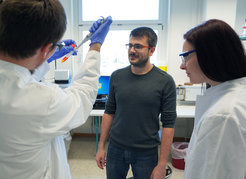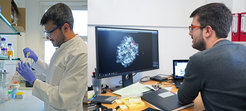"I try to read the minds of mice!"
Julien Hiblot, staff scientist in the department of Chemical Biology, on his story in life sciences - an interview.
What first got you interested in science?
In school, I liked the logical aspects of the natural sciences, especially biology and chemistry. However, what got me very passionate about science were my first university courses in biochemistry and evolution. I realized that living systems are all about building blocks - it’s like playing Lego to me, which also brings back some childhood memories.

Where did you train and what did you train in?
After a Bachelor in life sciences, I received my Master’s degree in structural, molecular and cell biology in Nancy (Lorraine University) in France. In parallel, I obtained a Magister in enzymology and microbiology. I then graduated with a PhD degree in structural biology in Marseille, with a focus on structure-based protein engineering. During my PhD, I also spent three months doing an exchange in the Weizmann institute in Israel. I then joined Kai Johnsson’s lab at EPFL for a postdoc, to add some chemical perspective to my work on protein engineering.
Your research: simple and in a nutshell?
I try to read the minds of mice! We are actually developing biosensors to better understand how the brain works.
What is so fascinating about that topic?
Our overall understanding of life sciences increased the past decades. However, there are still islands of poor understanding; how the brain works remains one of the biggest mysteries. As researchers, we use this organ in our work every day, but are still not able to understand it in its full complexity. It’s exciting to be part of this challenge!
How did you get interested in your particular research topic?
It wasn’t initially my research topic per se, but I wanted to use my knowledge in protein engineering to tackle a major research question and contribute to a ‘big picture’. Neuroscience just drew me in, and I got really interested in it. Who wouldn’t?
What does a day in your life as a researcher look like?
Every day is different, but I try to keep a balance in between bench work, supervision/management and administrative tasks. It’s a complex balance to keep. However, I find it very important to be actively involved in the experiments to effectively supervise and mentor students.

What do you like most about our institute? Why did you choose the MPI and Heidelberg for your career path?
The main reason to move here was the scientific environment: Heidelberg is a hub in life sciences. Being surrounded by so many potential collaborators, as well as the support from other departments in-house, are both strong advantages. We collaborate on both the development and applications of our biosensors. Because of the structure of the Max Planck Society, we can also dedicate more time to our science and therefore tackle complex scientific questions in a less restricted manner.
What would be your advice to young researchers starting out in your field?
Focus on the journey! Everything you are doing [internship-PhD-Postdoc] should be for the sake of the journey, not for an expected end result. It is primarily both a professional and personal learning phase. Research is a long process: being part of a stimulating scientific community and solving an important problem should be your main driving force.
What do you feel science should achieve for society?
I think there are three important aspects: increasing the global pool of knowledge, developing new technologies to increase people’s quality of life, and inspiring people. I feel like we need to do a better job of communicating science and making achievements accessible to the public. Scientific progress nowadays is very fast and we need to make sure that policy makers and the public are well informed, so that we have the right resources and correct environment for essential discoveries to flourish.
What would people be surprised to find out about you?
Talk to me and figure it out by yourself! I am always open to a good conversation and have various other interests than science: soccer, politics, philosophy, science fiction, the latest Star Wars movie…

